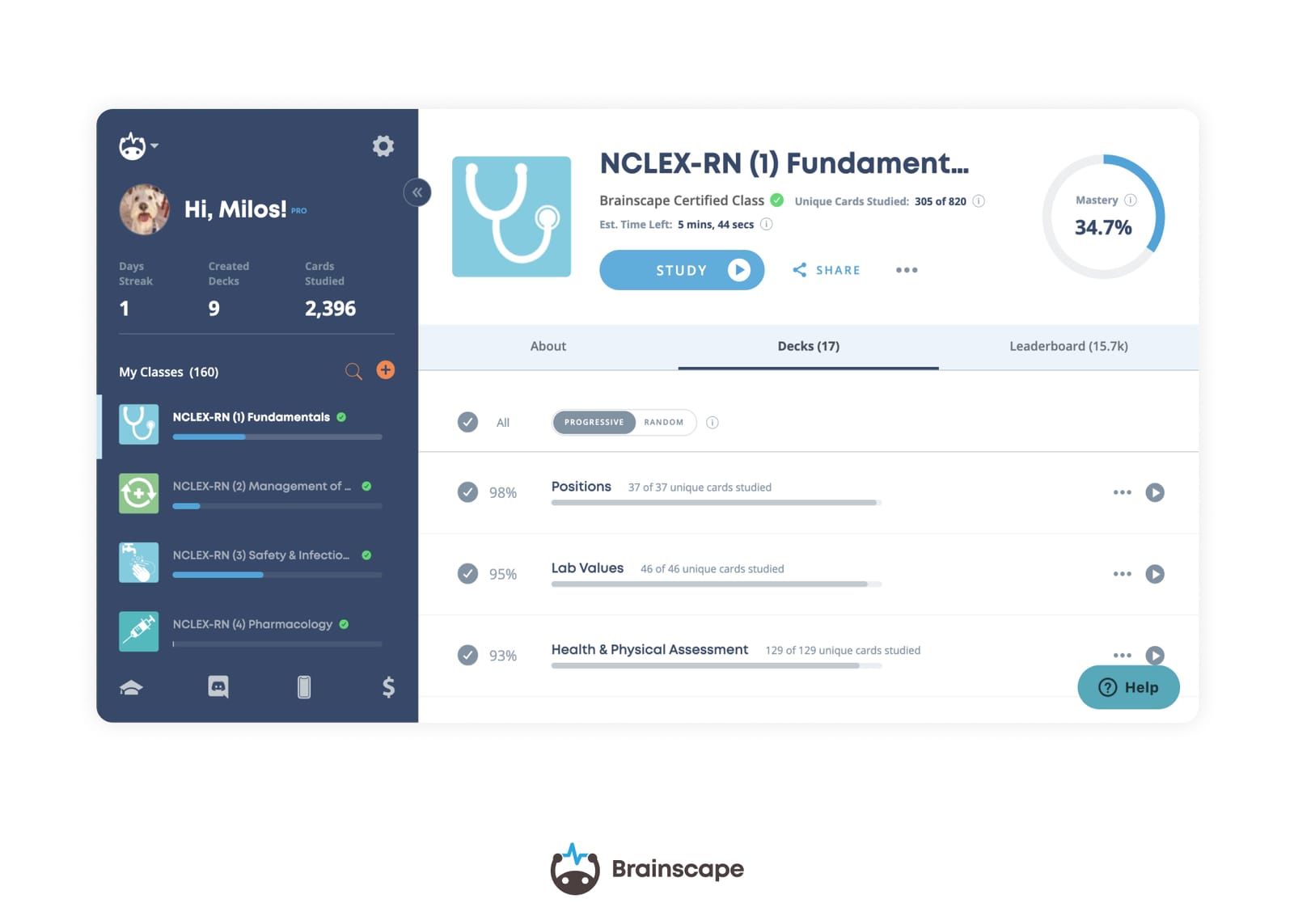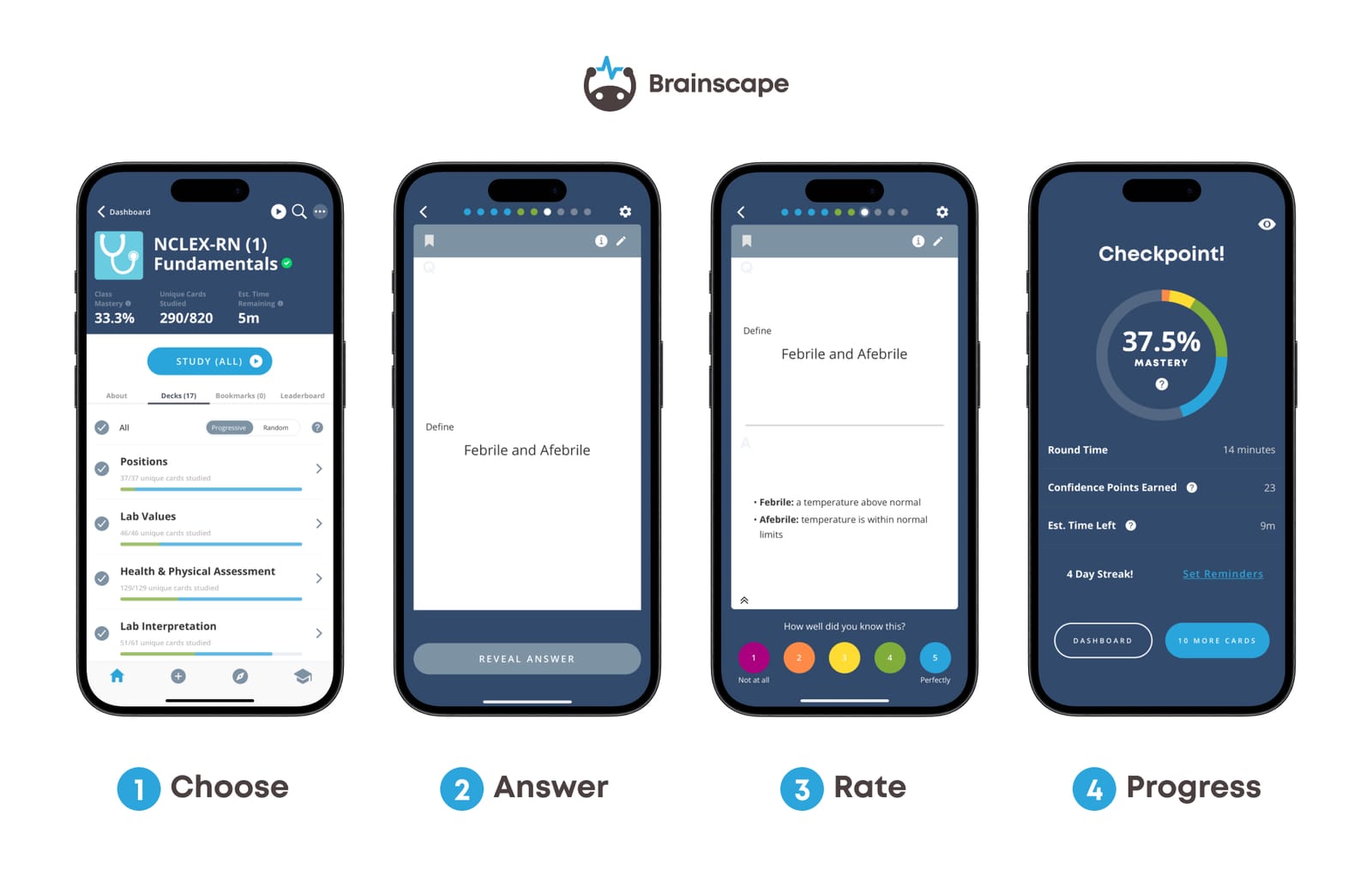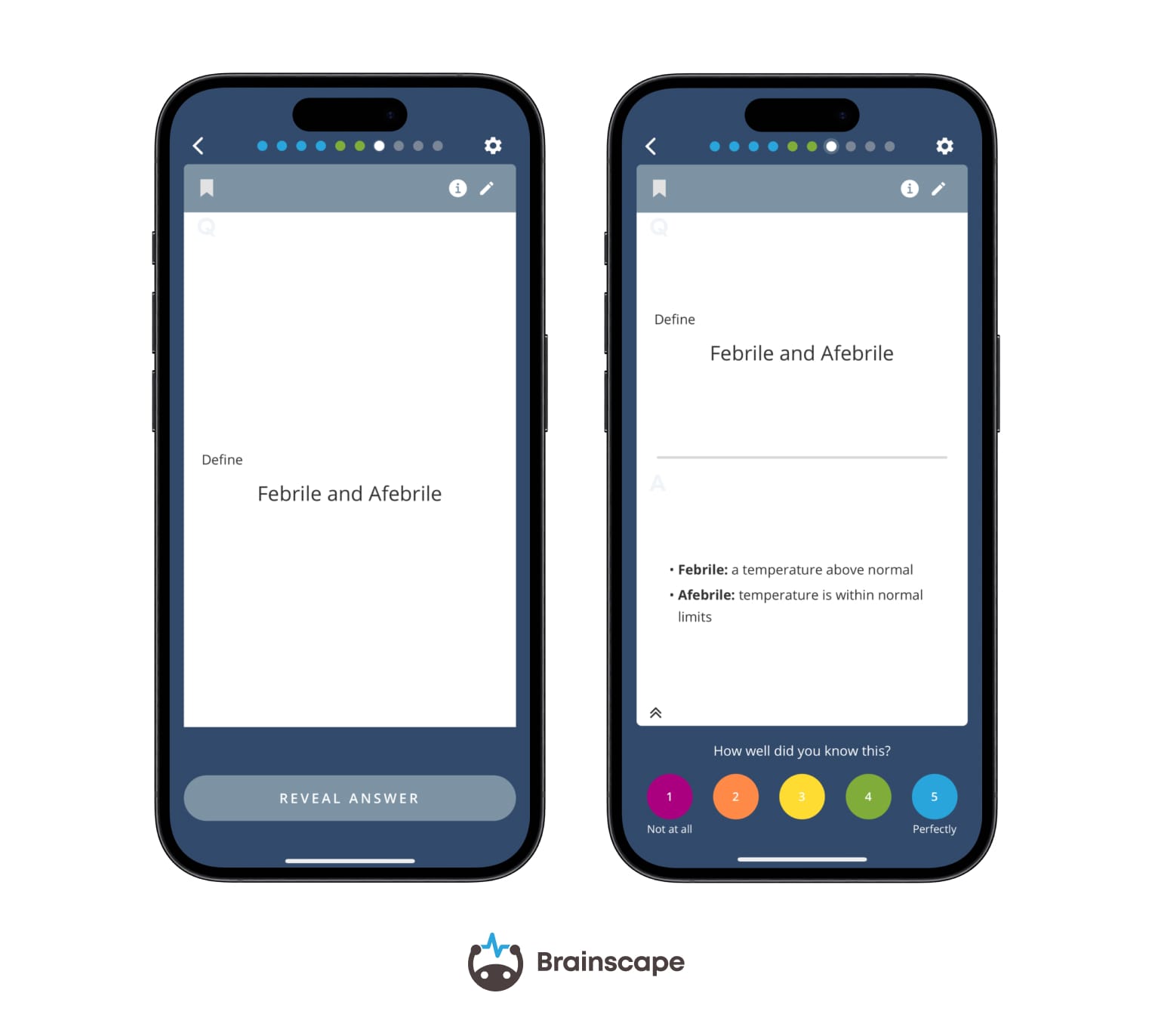The NCLEX is a monster of an exam, but it is the final hurdle between you and a thrilling, rewarding career as a nurse. This article is an NCLEX study guide, representing the best advice from our panel of nursing educators, as well as our own research and wisdom as a team of learning optimizers. By the end of it, you will have a sophisticated suite of strategies and tools necessary to break down the enormous volume of nursing content you need to learn, and do that systematically until you're ready to crush the NCLEX!
The topics covered include:
- Only learn what really counts
- What you need to know to pass the NCLEX
- Brainscape's NCLEX flashcards: the ultimate study weapon
- Other important NCLEX study tools
- How to study far more effectively for the NCLEX
- The best time to study for the NCLEX
Ready to get started? Let’s go!
Only Learn What Really Counts
All too often, nursing students get overwhelmed not only with how much there is to learn but over which study guide they should invest their trust in. But with the NCLEX fast approaching, your challenge shouldn't be to memorize every single word of your 1,000+ page study guide.
This is a recipe for cognitive overload, and it’s not at all true. There’s a much smaller portion of knowledge you need to master to pass. The problem? Most NCLEX study guides don’t make it clear (or they don’t know) what that portion of knowledge is.
We're going to tell you what that is, but the point to remember here is that when it comes to the NCLEX, there’s knowledge that really counts, and then there’s the superfluous rest. If you dedicate most of your time to studying those vital portions, you’ll do just fine. But if you get overwhelmed and rush around trying to memorize every single fact in that bible-sized study manual, you’ll put yourself on the fast track to burnout!
What You Need To Know To Pass The NCLEX
Okay, so what exactly DO you need to know to pass either the NCLEX Practical Nurse (PN) or Registered Nurse (RN) tests?
Well, for starters, they're almost exactly the same when it comes to content. The main difference is how they frame the test questions, and this reflects the roles of practical versus registered nurses in a hospital.
The NCLEX test plan is broken up into these sections:
- Management of Care (Coordinated Care for the NCLEX PN)
- Safety & Infection Control
- Health Promotion & Maintenance
- Psychosocial Integrity
- Basic Care & Comfort
- Pharmacological & Parenteral Therapies
- Reduction of Risk Potential
- Physiological Adaptation
‘Management of Care’ or ‘Coordinated Care’ carries the greatest weight in terms of assessment, accounting for between 17 to 23% of the test. The other sections are spread out fairly evenly after that, accounting for around 10 to 12% each.
The entire test integrates the nursing process of caring, communication, documentation, and teaching. So while there are 8 sections on the test, you may be tested on the nursing process in any of these sections.
Now here's the first of many tools we recommend you use to help you focus only on what you absolutely need to know...
Digital Flashcards: The Ultimate Study Weapon

When it comes to mastering the mountain of information required for the NCLEX, digital flashcards are one of the smartest, most efficient tools you can use. They take the overwhelming task of memorization and turn it into something structured, manageable, and scientifically optimized for your brain.
Apps like Quizlet and Brainscape are optimized to increase the pace at which the human brain learns medical information. Best of all, flashcards fit perfectly into a busy nursing student’s life. You can study a few cards while commuting, between classes, or during lunch breaks. Even five minutes here and there adds up to powerful progress over time.
Other Important NCLEX Study Tools
Review Courses
Knowing what to learn for the NCLEX is one challenge. Another is deciding which test prep or review resources to lean on (because there are many... some of which are not regulated or accredited). The review materials and services our nursing education partners recommend are:
- Saunders Comprehensive Review book
- The Hurst NCLEX Review course
- Klimek Reviews (the live, in-person review only)
- Remar Review
Other popular resources are:
- Kaplan NCLEX book and review course
- Mike Linares from SimpleNursing.com
- Sarah from RegisteredNurseRN.com
Then there’s NCSBN, the actual test writers. You’ll certainly get the official party line with their resources; however, they’re very much in the business of telling you to cover everything pwhen it comes to studying.
Practice Exams
Another crucial study tool is NCLEX practice questions, of which there are a myriad online. These aren’t regulated either, so you're just as likely to come across excellent resources as you are terrible ones. In the not-so-good practice exams, some of the questions are worded badly, giving students the impression the examiner is trying to ‘trick’ them into the wrong answer. And other times some of the answers are just plain wrong!
The practice NCLEX exams we trust are:
- The NCLEX Mastery app
- The Saunders Comprehensive Review (there are practice questions in the book and online)
Another popular resource for practice questions is UWorld. This is a great product to use if you are already very strong in your knowledge of nursing content. But if you are still focused on reviewing the basics, we recommend starting elsewhere.
Be aware that some test exam companies deliberately make their tests harder than the NCLEX. In theory, it’s meant to give students confidence (if I passed this, the NCLEX will be easy!) In practice, it’s often the opposite, and students can get discouraged by how much more they need to learn. That’s why we recommend sticking to the practice exams above, as they’re a fair representation of the NCLEX.
Nursing School
Being a good nurse is different from being a top NCLEX student. Unfortunately, many nursing schools focus primarily on training you to be a good nurse, and deal with NCLEX requirements by either:
- Assigning huge amounts of reading from brick-like textbooks, or
- Doing a three-day NCLEX review course at the end of the semester. (In other words, an extended NCLEX cram session.)
Neither of these methods is very effective. Simply reading the information doesn’t mean you’ll retain it. And trying to cram material into your head at the end of a semester is largely a waste of time, as very little of it will end up in your long term memory.
The best way to address this crucial gap is to use a flashcard app to drill yourself on the content throughout nursing school and/or your review period (the months leading up to the NCLEX).
Flashcard Creation
In addition to pre-made NCLEX flashcards, you can also use apps like Brainscape or Anki to make your own flashcards, either manually or using sophisticated AI tools. This can be very useful when addressing subject areas you’re not very strong in.

The extra steps you take to make your own flashcards will force you to break down complex topics into their simplest components. This process is a powerful way to deeply understand and embed knowledge so you’ll always have it.
How To Study For The NCLEX More Effectively
So far, we’ve covered what to study for the NCLEX (and it’s rather less than you’d think). Now we’re going to look at how to study.
Passive Versus Active Studying
In the same way that patients don’t present at the hospital with a perfect list of their symptoms, real-world study isn’t always straightforward.
For example, reading through material in a book may feel like you’re learning. It’s a great way to get an overview of what you need to learn. But it's a passive technique, and things learned passively don’t stay in your memory for long.
Passive studying may feel like you’re being productive, but it’s not really. It’s a bit like doing a pleasant stroll on flat ground to build muscle. It’s nice, but not effective. In contrast, active studying is hard work. And it really gets knowledge into your long-term memory.
Similarly, answering multiple-choice questions may seem like a great way to practice. After all, the NCLEX uses multiple-choice, right? It’s certainly a useful revision technique. Again, though, it’s not that great for putting information into your memory. This is because answering multiple-choice questions uses recognition, rather than active recall.
Recognition is just when you see a list of medications and recognize the one that’s used to decrease a fever.
Active recall is when you see the question: "What medication can be used to treat a fever?" And, without any clues, your brain goes and retrieves that piece of information from your memory. It’s a far more reliable way to test whether you really know something or not.
Active recall is what digital flashcards use to test your knowledge. This type of learning is especially important for the dense NCLEX sections like pharmacology.
Retaining What You’ve Learned
When you have literally hundreds of these facts to remember, you need to take the most efficient path, which is doing more than just reading the study guide. Fortunately, there’s a magic ingredient to truly learn information in a time-efficient way. That ingredient is called spaced repetition.
Spaced repetition relates to how often you review new information. Getting the timing of this right gives you the most efficient way to learn and retain information. There is an optimum spacing at which to revise new facts, and Brainscape does this for you automatically behind the scenes.
Spaced repetition is especially helpful when you don’t have much time available to study. By doing a little bit, often, you get far better results than students who try to cram all their study into the week before the test.
Here’s What Effective NCLEX Studying Looks Like
To sum up how to study efficiently for the NCLEX, there are three aspects:
- Understand the topic
- Learn: get the information into your brain (memorization)
- Retain: keep your knowledge fresh
1. Understand
Read through your study guide and make sure you understand everything in it. Highlight any parts that aren’t clear, and make a note to ask your teacher or other students to clarify them until you’ve fully mastered them.
Write the key concepts down in your own words. This is an important part of both understanding and memorization. When you put something into your own words, as well as the textbook version, you’re creating an extra ‘hook’ your brain can use to retrieve the information when you need it next.
Teach someone. Teaching someone else (especially a non-nursing student) is the best way to test your knowledge and ensure you have a firm grasp of the concepts.
2. Learn
Break each topic into small, bite-sized pieces of knowledge. This is an important step to getting information into your memory. Brains don’t ‘upload’ large volumes of data in one large information dump. They store information the same way you build a house: brick by brick.
This is where the digital flashcards are exceptionally useful. They quiz you on individual facts rather than overwhelming chunks.

This keeps you in the zone of optimal learning, where just the right amount of new material is mixed with information you already know. In other words, your working memory is stretched just enough to build new knowledge scaffolding. It’s like a perfectly-paced fitness workout... for your brain.
3. Retain
When you simply read a section of the NCLEX material and never look at it again until a week before your test, you leave yourself vulnerable to memory decay. New information stays in your short-term memory for a few hours and then fades. Even a quick review of new material will help fix it in your long-term memory far more effectively.
Studying a little every day means that by exam time, your brain has had plenty of time to fit the vast catalog of NCLEX knowledge into a neatly organized library of information.
Do this, and you’ll be one of those students who aren’t frazzled and stressed to the max at test time. Instead, you’ll be quietly confident, ready to ace the NCLEX, and start a new chapter of your life!
A Final Word On Studying For The NCLEX Effectively
The world needs more qualified nurses. And it always will. They do an incredibly important job. All the way back to Florence Nightingale, Walt Whitman, and before, nurses have risked their lives to help others. They’re on the front lines caring for the sick, the in-need, and the vulnerable.
The best way to get yourself into NCLEX study mode is to remember your end goal. The NCLEX is the final hurdle for you to vault over in order to become a nurse, and with focus, determination, and some effective study, you’re sure to get there.
**NCLEX-RN® is a registered trademark of the National Council of State Boards of Nursing (NCSBN), which neither sponsors nor endorses this product.
Additional Reading
- How to study medications for the NCLEX
- The best way to use NCLEX practice questions
- Does it matter which nursing school you attend?
References
2023 NCLEX-RN test plan. NCSBN. (n.d.-a). https://www.ncsbn.org/publications/2023-nclex-rn-test-plan
Home. NCLEX. (n.d.-a). https://www.nclex.com/
Kang, S. H. (2016). Spaced repetition promotes efficient and effective learning. Policy Insights from the Behavioral and Brain Sciences, 3(1), 12–19. https://doi.org/10.1177/2372732215624708
Kerfoot, B. P. (2010). Adaptive spaced education improves learning efficiency: A randomized controlled trial. Journal of Urology, 183(2), 678–681. https://doi.org/10.1016/j.juro.2009.10.005
McLeod, S. (2024) Vygotsky’s zone of proximal development, Simply Psychology - Vygotsky’s Zone Of Proximal Development. Available at: https://www.simplypsychology.org/zone-of-proximal-development.html
Xu, J., Wu, A., Filip, C., Patel, Z., Bernstein, S. R., Tanveer, R., Syed, H., & Kotroczo, T. (2024). Active recall strategies associated with academic achievement in Young Adults: A systematic review. Journal of Affective Disorders, 354, 191–198. https://doi.org/10.1016/j.jad.2024.03.010
